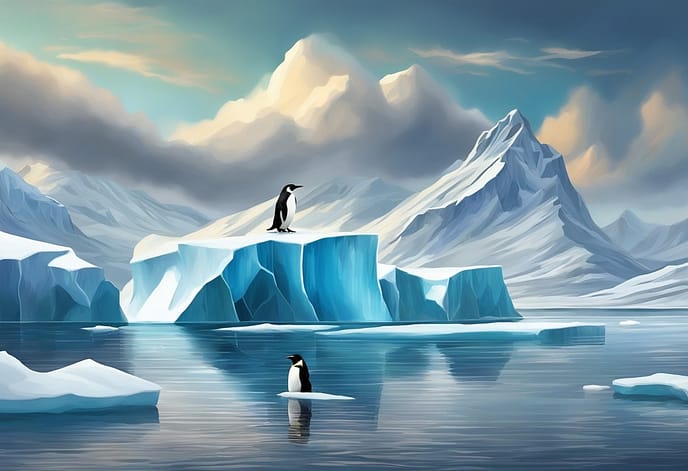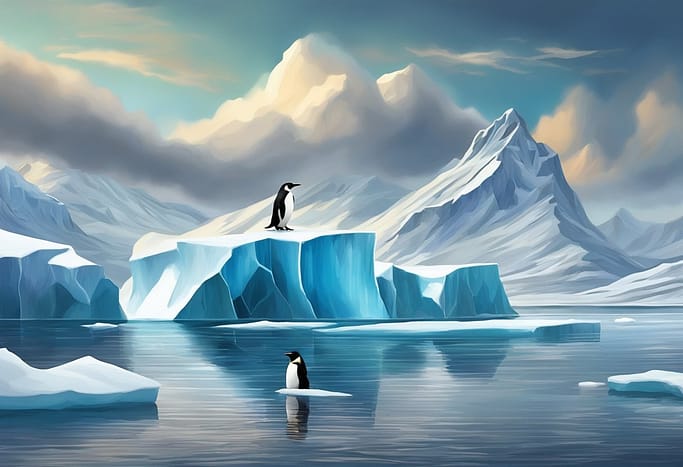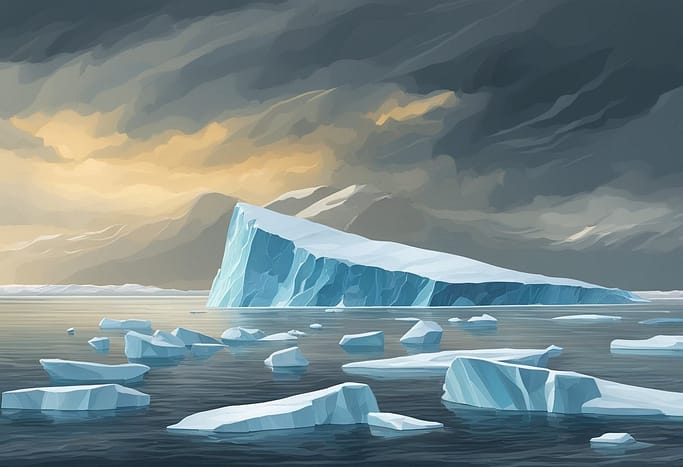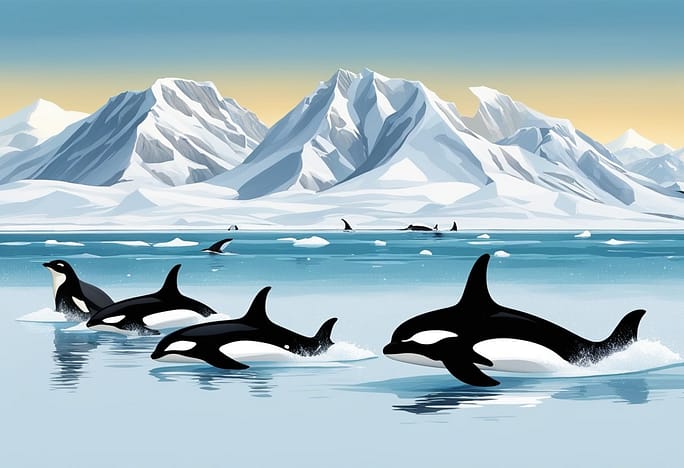The Weddell Sea is a vast body of water in the Southern Ocean, bordered by the Antarctic Peninsula and Coats Land. It serves as a crucial habitat for diverse marine life and is significant for scientific research related to climate change and oceanography. This sea is renowned for its unique ecosystems and massive ice formations, which draw researchers and adventure seekers alike.
Notably, the Weddell Sea plays a significant role in global environmental health, impacting weather patterns and ecological balance. With its stunning landscapes and diverse wildlife, this region serves as a focal point for ecological conservation efforts. The Weddell Sea is not just a remote area; it is a vital part of our planet’s ecological framework, offering valuable insights into the effects of climate change.
Exploring the Weddell Sea provides a glimpse into a delicate ecosystem where historical significance and modern scientific investigation meet. There is much to learn about this extraordinary marine area and its vital importance for future generations.
Key Takeaways
- The Weddell Sea is vital for marine biodiversity and scientific study.
- Its unique geography influences climate patterns and ocean dynamics.
- Ongoing environmental efforts aim to protect its delicate ecosystems.
Geography and Location
The Weddell Sea is a significant area located within the Southern Ocean. It features distinct boundaries and noteworthy islands, crucial for understanding its geographic context.
Boundaries
The Weddell Sea is situated between West Antarctica and East Antarctica. The long and narrow land mass of the Antarctic Peninsula defines its western boundary. On the eastern side, it is bordered by Coats Land, which starkly contrasts its rugged terrain.
The sea extends from approximately 73° S to 40° W, encompassing a vast area that plays a vital role in ocean currents and marine ecosystems. The region experiences extreme weather conditions, characterized by strong winds, particularly along the Antarctic Peninsula’s coastline. This harsh environment contributes to the unique oceanographic characteristics of the Weddell Sea.
Islands
Several islands are found within the Weddell Sea, each adding to its geographical intrigue. One notable island is Bouvet Island, a small, uninhabited volcanic island. It is strategically located and often mentioned in discussions about the region’s maritime boundaries.
Another essential feature is the South Orkney Islands, which lie just off the northern edge of the Weddell Sea. These islands are home to a diverse array of wildlife, including seals and penguins, which thrive in the frigid Antarctic waters. The islands contribute to the region’s biodiversity, making it an essential area for scientific research and exploration.
Climate and Oceanography
The Weddell Sea plays a crucial role in the Antarctic climate and oceanographic systems. Its unique characteristics significantly impact sea ice formation and water temperatures, affecting global climate patterns.
Sea Ice Conditions
The Weddell Sea is characterised by significant ice formation, particularly during the winter months. The extent of this ice varies annually, influenced by changes in temperature and ocean currents.
In recent years, climate change has caused fluctuations in sea ice levels. A warming trend causes ice to melt faster than it can reform. This has implications for wildlife and ocean ecosystems, as the ice provides habitat for species like seals and penguins.
Researchers have observed a decline in the thickness and duration of sea ice cover. Thinner ice reflects less sunlight, which can further increase local water temperatures. The changes in sea ice distribution also affect marine life and nutrient distribution in the water.
Water Temperatures
Water temperatures in the Weddell Sea have been rising significantly. Studies show that temperatures deeper than 2,000 metres are warming five times faster than the global average.
This increase can disrupt local ecosystems. Warmer waters can lead to changes in fish distribution, impacting both species and the fishing industry.
Additionally, the dense water formation in the Weddell Sea has a significant influence on ocean currents far beyond its boundaries. Temperature changes can alter circulation patterns, impacting climate regulation in distant regions.
Monitoring these temperature changes is critical for understanding the broader implications of climate change on global ocean systems. The warming of the Weddell Sea is a clear indicator of the more significant environmental shifts taking place worldwide.
Ecosystem and Wildlife
The Weddell Sea is a complex and vibrant ecosystem. It supports a variety of marine life and is vital for conservation efforts to preserve its unique wildlife.
Marine Life
The Weddell Sea is rich in biodiversity. It hosts numerous species, including Weddell seals, elephant seals, and various seabirds. The presence of krill in massive swarms is pivotal, as they form the foundation of the food web.
This abundance benefits predators such as humpback and killer whales. Birds like the South Georgia petrel and Antarctic skua also thrive here. They rely on nutrient-rich waters that promote high productivity.
Ice alterations enable ice algae and bacteria to thrive, thereby supporting life beneath the ice surface. These organisms provide energy for other species, creating a balanced ecosystem.
Conservation Efforts
Conservation efforts in the Weddell Sea aim to protect its fragile ecosystem. Researchers monitor the impact of climate change and human activity on marine life.
Protected marine areas have been established to allow habitats to recover and regenerate. These areas are crucial for the breeding and feeding of many species.
Additionally, international agreements emphasise sustainable fishing practices. The goal is to manage resources carefully while ensuring the protection of biodiversity. Awareness campaigns also inform the public about the importance of preserving this unique environment.
Historical Significance
The Weddell Sea has played a vital role in exploration and scientific research. Its unique geography and biodiversity have attracted attention for centuries, and significant expeditions and research initiatives have shaped our understanding of this remote region.
Exploration
The history of exploration in the Weddell Sea dates back to the early 19th century. British explorer James Weddell, named after the sea, charted these waters in 1823. He discovered an unusually open route southeast of the South Orkney Islands.
His journey marked one of the first thorough examinations of the region. Later expeditions, such as Ernest Shackleton’s famous Endurance expedition in 1914, highlighted the harsh conditions and challenges of navigating this icy environment.
These explorations have made a significant contribution to maritime and Antarctic history, showcasing the bravery and resilience of the explorers. They laid the foundation for future scientific studies and increased interest in the Antarctic region.
Research Stations
Research stations have been established in the Weddell Sea to study its unique ecosystem. The Weddell Sea is a vital habitat for numerous marine species, including seals and penguins. Scientists conduct studies to understand the impact of climate change on these organisms.
Notable research projects have aimed to unlock the secrets of the deep sea. Initiatives focus on oceanography, geology, and marine biology. This research is crucial for developing conservation strategies and understanding the broader implications of climate change in polar regions.
The collaborative efforts of international research teams continue to advance knowledge and awareness about this vital area of the world. Such efforts underscore the importance of ongoing exploration and study of the Weddell Sea.
Economic and Political Aspects
The Weddell Sea presents both economic opportunities and complex political challenges. Fishing rights and territorial claims have a significant impact on the region’s ecosystem and international relations.
Fishing Industry
The fishing industry in the Weddell Sea is a vital aspect of its economy. It provides food and livelihoods for many communities. Species such as krill and various fish are harvested here, supporting local and international markets.
The demand for krill has increased primarily due to its high nutritional value and its use in aquaculture and pharmaceuticals. Proper management is crucial to ensure sustainable fishing practices. Illegal, unreported, and unregulated (IUU) fishing poses a significant threat to the marine environment. Regulatory bodies work to monitor and manage fish stocks effectively.
Territorial Claims
Territorial claims in the Weddell Sea involve multiple countries with interests in Antarctica. Countries such as Argentina, the United Kingdom, and Chile assert claims based on historical exploration and colonisation. These claims often overlap, leading to disputes.
The Antarctic Treaty System governs these claims, promoting scientific exploration and prohibiting military activity. Nonetheless, geopolitical tensions can rise, mainly as climate change opens new navigation routes and access to resources. Ongoing discussions focus on striking a balance between national interests and protecting the area’s ecological integrity. The prospect of valuable resources, including oil and gas, further complicates these political dynamics.
Environmental Concerns
Climate change and pollution are causing significant environmental challenges in the Weddell Sea. These factors threaten the fragile ecosystems and wildlife that depend on this unique marine environment.
Climate Change Impact
The Weddell Sea is experiencing rapid changes due to climate change. Water temperatures in deeper regions are rising, with increases of 0.0021 to 0.0024 degrees Celsius reported in recent studies. This warming affects the polar ecosystems, disrupting the habitats of various marine species.
Additionally, increased CO2 levels contribute to ocean acidification. This phenomenon can harm shellfish and other marine organisms that rely on calcium carbonate to grow. The effects extend to the entire food web, impacting fish populations and, ultimately, the communities that depend on them.
Pollution
Pollution is another critical concern in the Weddell Sea. Recent research has identified microplastics, including fragments from paint, in marine waters. These tiny particles pose a risk to aquatic life, as they can be ingested by fish and birds, leading to health issues.
The presence of microplastics highlights the need for stricter regulations and monitoring. Efforts to reduce waste entering the marine environment are vital. Protecting the Weddell Sea’s ecosystems requires a targeted approach to addressing pollution sources and mitigating their impacts on wildlife.
Scientific Research
The Weddell Sea is a hotspot for scientific research, emphasising its unique biological and oceanographic conditions. These studies contribute to understanding the impacts of climate change and ecosystem dynamics.
Biological Studies
Research in the Weddell Sea often focuses on the diverse marine life that inhabits its waters. The area is home to species such as Weddell seals and various types of krill, which play essential roles in the aquatic food web.
Scientists analyse the interactions between different species to understand how they contribute to ecosystem stability. For instance, research has revealed how predators, such as seals, influence krill populations.
Additionally, studies frequently examine the impact of climate change on biodiversity. The effects of warming waters and changing sea ice patterns are of particular concern. Such information is vital for developing conservation strategies.
Oceanographic Expeditions
Oceanographic research in the Weddell Sea examines the physical and chemical properties of its waters. Studies examine temperature, salinity, and currents to understand their impact on marine ecosystems.
One significant area of focus is the Weddell Sea’s role in global ocean circulation. Researchers collect data using advanced technologies, including satellite imagery and autonomous underwater vehicles.
These expeditions offer valuable insights into how oceanographic processes impact climate patterns. For example, changes in sea ice can alter the distribution of heat in the ocean, thereby affecting global weather systems.
These findings deepen scientific knowledge and inform environmental policies aimed at protecting the region.
Frequently Asked Questions
The Weddell Sea is home to a diverse array of marine life and boasts unique ecosystem characteristics. Due to its rich biodiversity and notable geographical features, it draws interest from tourists and researchers alike. Below are answers to some common questions about this fascinating region.
What species of large swimming animals can be observed near the Weddell Sea?
The Weddell Sea is home to several large swimming animals. Notable species include various types of whales, such as Orcas and Minke whales. It also supports populations of seals, including the Weddell seal, which is often seen lounging on the ice.
What are some notable characteristics of the Weddell Sea ecosystem?
The Weddell Sea ecosystem is marked by its cold waters and extensive sea ice. It has a significant amount of phytoplankton, which serves as the foundation for the food web. The area also features unique underwater topography, including deep oceanic trenches and seamounts.
How deep is the Weddell Sea at its deepest point?
The deepest point of the Weddell Sea is approximately 7,500 metres, making it one of the deepest seas in the world. Its depth contributes to the formation of complex ocean currents and influences the local climate.
Can tourists travel to the Weddell Sea, and if so, what should they expect?
Yes, tourists can visit the Weddell Sea through guided tours and expedition cruises. They should expect cold weather, vast icy landscapes, and opportunities to see wildlife. Activities may include ice trekking and observing marine animals in their natural habitats.
Which nation claims sovereignty over the territory adjacent to the Weddell Sea?
No single nation claims sovereignty over the Weddell Sea. The Antarctic Treaty System governs the region, which stipulates that Antarctica is a global commons. This means no country can claim territorial rights.
Has the oil been explored or extracted within the Weddell Sea area?
There has been no large-scale exploration or extraction of oil in the Weddell Sea to date. The region’s harsh environment and international treaties limit such activities, and environmental concerns also significantly discourage oil exploration in this sensitive area.










